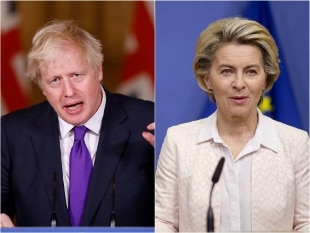Brexit, no agreement: negotiations on pause.
Now it's up to von der Leyen-Johnson
Share
05 December 2020The stalemate between the EU and the United Kingdom on post Brexit trade relations remains: Boris Johnson and Ursula von der Leyen, after a telephone conversation that did not break the deadlock, have agreed to continue negotiations due to "significant differences", which if not resolved, will result in a 'no deal'. The President of the Commission and the British Prime Minister will speak again on Monday. Meanwhile the ball returns to the negotiators, for a new round, set for tomorrow.
"In a phone call about the ongoing negotiations between the EU and the UK, we welcomed the fact that progress has been made in many areas - said von der Leyen after the interview - however, significant differences remain on
three issues. criticisms
: level playing field, governance and fisheries. Both sides stressed that no agreement is achievable if these problems are not resolved, "added von der Leyen. "While acknowledging that these are serious differences, we agreed that our negotiating teams should make a further effort to see if they can be resolved. We therefore ask our chief negotiators to meet again tomorrow in Brussels," said the Commission President.
The phone call between the two leaders lasted over an hour, after talks in London were suspended yesterday due to lack of progress. "We will see if there is a way forward. The work continues tomorrow", confirmed in a tweet the EU chief negotiator, Michel Barnier. Before the interview, Downing Street sources admitted that the chances are no more than 50%.
The transition period after the actual exit of the United Kingdom from the European Union - which took place on January 31 - will end at the end of this year, after which, in the event of no agreement, the commercial relations between the two blocks will be governed by the rules generals of the World Trade Organization.
Four years after the referendum that in June 2016 sanctioned the separation of the United Kingdom from the EU, there is less than a month to go until the end of the transitional period, to that January 1, 2021 in which EU rules will no longer apply to the United Kingdom. A comprehensive agreement on reciprocal relations ran aground on some obstacles: the regulation of fishing rights in each other's waters, in particular the English Channel, fair competition (in particular, the rules on public subsidies to businesses) and the "governance" of agreement, or the management of disputes.
On the question of fishing, there is a particular interest from France, whose fishing boats carry out most of the cod harvest in the waters of the "Channel". Paris has already threatened to veto the deal if its demands are not met.

